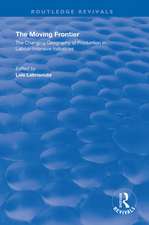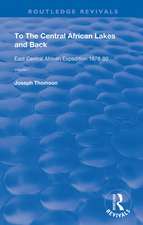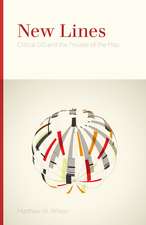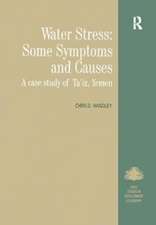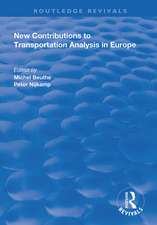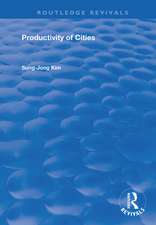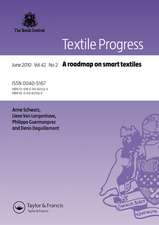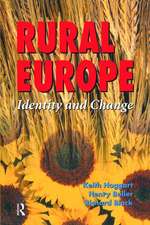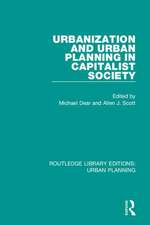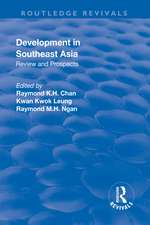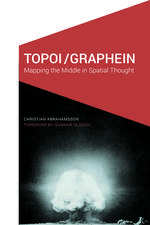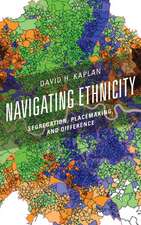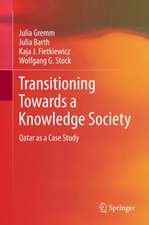Migration, Gender and Home Economics in Rural North India
Autor Dinesh K. Nauriyal, Nalin Singh Negi, Rahul K. Gairolaen Limba Engleză Paperback – 30 sep 2021
This book will be of great value to scholars and researchers of development economics, agricultural economics, environment studies, sociology, social anthropology, population studies, gender and women’s studies, social psychology, migration and diaspora studies, South Asian studies and behavioral studies.
| Toate formatele și edițiile | Preț | Express |
|---|---|---|
| Paperback (1) | 386.00 lei 6-8 săpt. | |
| Taylor & Francis – 30 sep 2021 | 386.00 lei 6-8 săpt. | |
| Hardback (1) | 764.20 lei 6-8 săpt. | |
| Taylor & Francis – 5 noi 2019 | 764.20 lei 6-8 săpt. |
Preț: 386.00 lei
Nou
Puncte Express: 579
Preț estimativ în valută:
73.86€ • 76.20$ • 61.64£
73.86€ • 76.20$ • 61.64£
Carte tipărită la comandă
Livrare economică 26 martie-09 aprilie
Preluare comenzi: 021 569.72.76
Specificații
ISBN-13: 9781032176710
ISBN-10: 1032176717
Pagini: 260
Ilustrații: 19 Illustrations, black and white
Dimensiuni: 156 x 234 x 14 mm
Greutate: 0.37 kg
Ediția:1
Editura: Taylor & Francis
Colecția Routledge India
Locul publicării:Oxford, United Kingdom
ISBN-10: 1032176717
Pagini: 260
Ilustrații: 19 Illustrations, black and white
Dimensiuni: 156 x 234 x 14 mm
Greutate: 0.37 kg
Ediția:1
Editura: Taylor & Francis
Colecția Routledge India
Locul publicării:Oxford, United Kingdom
Public țintă
PostgraduateCuprins
1 Introduction. 2 Contemporary trends of migration in India. 3 Data and methodology. 4 Profile of the sample population. 5 Patterns of farm activities. 6 Health status and treatment seeking behaviour. 7 Familial life and work participation. 8 Perceptions of husbands’ out-migrations. 9 Epilogue: of hills and homes.
Notă biografică
Dinesh K. Nauriyal is Professor of Economics in the Department of Humanities and Social Sciences at the Indian Institute of Technology, Roorkee, India. He is the lead co-editor of Buddhist Thought and Applied Psychological Research (Routledge, 2006).
Nalin Singh Negi is Senior Research Manager at Vital Strategies, New Delhi, India.
Rahul K. Gairola is The Krishna Somers Lecturer in English and Postcolonial Literature and a Fellow of the Asia Research Centre at Murdoch University, Western Australia. He is the author of Homelandings: Postcolonial Diasporas & Transatlantic Belonging (2016).
Nalin Singh Negi is Senior Research Manager at Vital Strategies, New Delhi, India.
Rahul K. Gairola is The Krishna Somers Lecturer in English and Postcolonial Literature and a Fellow of the Asia Research Centre at Murdoch University, Western Australia. He is the author of Homelandings: Postcolonial Diasporas & Transatlantic Belonging (2016).
Recenzii
‘Migration, Gender and Home Economics in Rural North India combines urgent sociological realities with material, labour, and economic demands that shape and design new lives in Himalayan and Deccan plateau communities in the 21st century. Nauriyal, Negi, and Gairola synthesize data in a lucid manner that the co-authors have rigorously researched. Focusing on the complex challenges and kinship dynamics of family members in general, and wives in particular, who are left-behind in their homestead migrating male laborers from Garhwal, Utttarakhand, this illuminating and lively study fills a gap in research that documents community lives in remote north Indian hinterlands. The book also stages the backdrop of this migration against international and internal migration, thus invoking the international implications. As a region that borders China, Nauriyal, Negi, and Gairola also make abundantly clear the potential security, in addition to economic, implications that mark the urgency of this timely and original study.’ — Amita Singh, Professor, Centre for the Study of Law and Governance (CSLG); Chairperson, Special Centre for Disaster Research, Jawaharlal Nehru University, India
‘What happens to the people left behind by emigration from poor places in the global south? Focused on the experience of Uttarakhand, India, Migration, Gender and Home Economics in Rural North India highlights the complex personal, social, nutritional and health challenges faced by women in these communities as well as their uneven mitigation by the remittances and increased social esteem that migration yields as a household strategy. The book serves thus as a salutary counterpoint to decontextualized accounts of migrant agency that only focus on men self-investing in education and the promise of work after they leave. And in detailing the background 'home economics' of the overall household experience of migration, Nauriyal, Negi, and Gairola urgently remind us of whole worlds of suffering and survival obscured by today's rising rejectionist rhetoric about 'economic migrants' from the global south.’ — Matthew Sparke, Professor of Politics, University of California, Santa Cruz (UCSC), USA
‘In Migration, Gender, and Home Economics in Rural North India, Nauriyal, Negi, and Gairola offer an insightful panorama of the experiences of Garhwali families who are left behind when (mostly) men migrate for economic opportunities to other parts of India. While out-migration is largely driven by men, the effects go far beyond the individual migrant. In that way, the book’s focus on agriculture, health outcomes, reproductive decision making, work and employment, and other socio-economic factors offers a robust picture of the challenges and opportunities that migration engenders. By taking a household approach to migration, Migration, Gender, and Home Economics in Rural North India reveals the paradoxes of migration: on the one hand, migrants experience downward social mobility as they transition from agricultural workers to waged laborers. On the other, the influx of remittances boosts the economic standing of family members left behind, though that gain comes with psychological cost. Nauriyal, Negi, and Gairola emphasize the gendered dynamics of rural households, compelling the rehearsed field of migration studies to critically consider new economic, social, and psychological impacts of movement on the entire family unit. For this reason, this dynamic study is a welcome text across disciplines and will enhance understandings of the very important role that women play as wives in the migration processes in and beyond northern India.’— Amy Bhatt, Associate Professor of Gender & Women’s Studies and Affiliate Associate Professor in the Language, Literacy & Culture Program and the Asian Studies Program, University of Maryland, Baltimore County (UMBC), USA
‘This compelling study by Nauriyal, Negi, and Gairola is urgent reading for those who seek to gain a panoramic understanding of the link between gender and mobility in rural North India today. In a world that is increasing marked by global conflict, global migrations, and global warming, the authors provide a lucid study backed up with scores of statistics and tables. Their synthesis of the data is commendable, and the writing appeals to policy makers, students, scholars, and the general public. Migration, Gender, and Home Economics in Rural North India is a brilliant addition to most bookshelves in and beyond South Asia.’— R. B. Singh, Secretary General: International Geographical Union (IGU); Member-International Science Council (ISC)-Scientific Committee-UHW; Professor, Department of Geography, Delhi School of Economics, University of Delhi, India
‘Why do the wives of out-migrants make fewer decisions than the wives of men who work in their villages? Do the wives of out-migrants put in longer hours of paid and unpaid labor in comparison with other wives? Do the impact of remittances consistently raise the economic and social status of the left behind family? Answers to these questions are often not what the public assumes. Based on survey and focus group data collected in the high migration zone of Uttarakhand, the co-authors offer a scrupulously detailed analysis of ground conditions for remittance-receiving families and of women’s perceptions of the benefits and costs of living without a husband who is physically nearby. This is excellent, interdisciplinary work that importantly fills a gap on migration research on the relatively new state of Uttarakhand.’— Bonnie Zare, Associate Professor of Sociology and Affiliate in the Women's and Gender Studies Program, Virginia Polytechnic Institute and State University (Virginia Tech), USA
‘Nauriyal, Negi, and Gairola have written Migration, Gender and Home Economics in Rural North India to demonstrate to academia and policy makers that migration is not simply an issue for developed countries, but rather is making a big impact in the "shadows of Himalaya." This book does a superb job of combining fine economist analysis with socio-cultural knowledge of rural India. It clearly stretches beyond narrow economics and innovatively demonstrates how out-migrant men also contribute to women empowerment. This is a "must-read" for all readers interested in migration, gender studies, and local decision-makers in northern India. Well-researched with powerful insights to a key global phenomenon of today – gendered migration from rural to urban centres.’ — Petr Blizkovsky, Director, Council of the European Union; General Secretariat Directorate-General, Agriculture, Fisheries, Social Affairs and Health – LIFE Directorate, Agriculture (SCA: Special Committee Agriculture) and Social Policy; Visiting Professor, Free University Brussels, Belgium; Associated Professor Mendel University Brno, The Czech Republic‘This book shows the profound impact of migration on households and women living in mountainous areas. It presents a comparative study of migrant and non-migrant households and the life experiences of left behind women parallel to women living with their husbands in northern India. A worthwhile read for those who are interested in migration research and rural development.’— R. B. Bhagat, Professor and Head, Department of Migration and Urban Studies, International Institute for Population Sciences, Mumbai, India
‘What happens to the people left behind by emigration from poor places in the global south? Focused on the experience of Uttarakhand, India, Migration, Gender and Home Economics in Rural North India highlights the complex personal, social, nutritional and health challenges faced by women in these communities as well as their uneven mitigation by the remittances and increased social esteem that migration yields as a household strategy. The book serves thus as a salutary counterpoint to decontextualized accounts of migrant agency that only focus on men self-investing in education and the promise of work after they leave. And in detailing the background 'home economics' of the overall household experience of migration, Nauriyal, Negi, and Gairola urgently remind us of whole worlds of suffering and survival obscured by today's rising rejectionist rhetoric about 'economic migrants' from the global south.’ — Matthew Sparke, Professor of Politics, University of California, Santa Cruz (UCSC), USA
‘In Migration, Gender, and Home Economics in Rural North India, Nauriyal, Negi, and Gairola offer an insightful panorama of the experiences of Garhwali families who are left behind when (mostly) men migrate for economic opportunities to other parts of India. While out-migration is largely driven by men, the effects go far beyond the individual migrant. In that way, the book’s focus on agriculture, health outcomes, reproductive decision making, work and employment, and other socio-economic factors offers a robust picture of the challenges and opportunities that migration engenders. By taking a household approach to migration, Migration, Gender, and Home Economics in Rural North India reveals the paradoxes of migration: on the one hand, migrants experience downward social mobility as they transition from agricultural workers to waged laborers. On the other, the influx of remittances boosts the economic standing of family members left behind, though that gain comes with psychological cost. Nauriyal, Negi, and Gairola emphasize the gendered dynamics of rural households, compelling the rehearsed field of migration studies to critically consider new economic, social, and psychological impacts of movement on the entire family unit. For this reason, this dynamic study is a welcome text across disciplines and will enhance understandings of the very important role that women play as wives in the migration processes in and beyond northern India.’— Amy Bhatt, Associate Professor of Gender & Women’s Studies and Affiliate Associate Professor in the Language, Literacy & Culture Program and the Asian Studies Program, University of Maryland, Baltimore County (UMBC), USA
‘This compelling study by Nauriyal, Negi, and Gairola is urgent reading for those who seek to gain a panoramic understanding of the link between gender and mobility in rural North India today. In a world that is increasing marked by global conflict, global migrations, and global warming, the authors provide a lucid study backed up with scores of statistics and tables. Their synthesis of the data is commendable, and the writing appeals to policy makers, students, scholars, and the general public. Migration, Gender, and Home Economics in Rural North India is a brilliant addition to most bookshelves in and beyond South Asia.’— R. B. Singh, Secretary General: International Geographical Union (IGU); Member-International Science Council (ISC)-Scientific Committee-UHW; Professor, Department of Geography, Delhi School of Economics, University of Delhi, India
‘Why do the wives of out-migrants make fewer decisions than the wives of men who work in their villages? Do the wives of out-migrants put in longer hours of paid and unpaid labor in comparison with other wives? Do the impact of remittances consistently raise the economic and social status of the left behind family? Answers to these questions are often not what the public assumes. Based on survey and focus group data collected in the high migration zone of Uttarakhand, the co-authors offer a scrupulously detailed analysis of ground conditions for remittance-receiving families and of women’s perceptions of the benefits and costs of living without a husband who is physically nearby. This is excellent, interdisciplinary work that importantly fills a gap on migration research on the relatively new state of Uttarakhand.’— Bonnie Zare, Associate Professor of Sociology and Affiliate in the Women's and Gender Studies Program, Virginia Polytechnic Institute and State University (Virginia Tech), USA
‘Nauriyal, Negi, and Gairola have written Migration, Gender and Home Economics in Rural North India to demonstrate to academia and policy makers that migration is not simply an issue for developed countries, but rather is making a big impact in the "shadows of Himalaya." This book does a superb job of combining fine economist analysis with socio-cultural knowledge of rural India. It clearly stretches beyond narrow economics and innovatively demonstrates how out-migrant men also contribute to women empowerment. This is a "must-read" for all readers interested in migration, gender studies, and local decision-makers in northern India. Well-researched with powerful insights to a key global phenomenon of today – gendered migration from rural to urban centres.’ — Petr Blizkovsky, Director, Council of the European Union; General Secretariat Directorate-General, Agriculture, Fisheries, Social Affairs and Health – LIFE Directorate, Agriculture (SCA: Special Committee Agriculture) and Social Policy; Visiting Professor, Free University Brussels, Belgium; Associated Professor Mendel University Brno, The Czech Republic‘This book shows the profound impact of migration on households and women living in mountainous areas. It presents a comparative study of migrant and non-migrant households and the life experiences of left behind women parallel to women living with their husbands in northern India. A worthwhile read for those who are interested in migration research and rural development.’— R. B. Bhagat, Professor and Head, Department of Migration and Urban Studies, International Institute for Population Sciences, Mumbai, India
Descriere
This book critically examines the socio-economic impacts of out-migration on households and gender dynamics in rural northern India.

